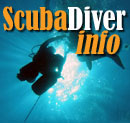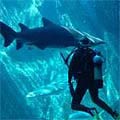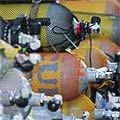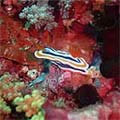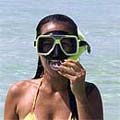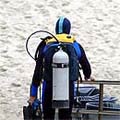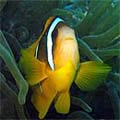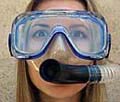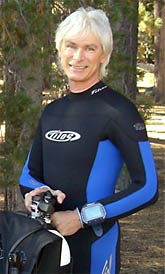« Underwater again, and thoughts about the PADI approach | Main | PADI Open Water Final Test - Never too old to be nervous »
July 29, 2006
I hate controlled emergency ascents
I hate controlled emergency ascents! Just wanted to get that out of my system.
A "controlled emergency swimming ascent," of course, is what you do when you're totally out of air and your buddy is too far away to help you out with his or her alternate air source. So what you do is look up, slowly release air into your regulator, going "ahhhh..." so that the remaining air in your lungs doesn't do damage as it expands while you get up to the surface. We practised that in the deep end of the pool two times today, sort of simulating things by not breathing in once the instructor gave the signal, then swimming horizontally and then up until we broke the surface. Then you flip on your back and blow up your BC by mouth as there is, of course, no air left in the tank. Or would not be if it were a real emergency.
Problem is, when there is no air, there is no air, and that is mighty spooky when you're underwater. We HAD air, of course, but even trying to play by the rules was hard. When you have to breathe, that's a pretty powerful urge, and it's surprisingly easy to freak a bit. I mean, how difficult can it be to hold your breath for a minute or so? Sometimes very. So the first time around I almost immediately feel I am out of air. I cheat a bit by taking two eensy little sips of air, but still gasp when I break the surface. And then blow up the BC from the tank. Wrong, wrong, wrong. We do it again and it goes a bit better. But I sure hope I'll never find myself in that situation. At the end of the class, Amanda goes: "One thousand pounds for me! Always." referring to the fact that once the pressure in your tank is down to 1,000 psi, you think about heading back up. So there.
The rest of Session Five of the PADI Open Water Scuba class was entirely more pleasant. We spent an hour or so in the classroom where instructor Chuck dispensed pearls of his very considerable wisdom, explained the pros and cons of different manufacturers' gear, and spent a good amount of time on the Dive Tables. Slowly and making sure everyone understood exactly how it all worked. No Decompression Limit. Residual Nitrogen Time. Actual Bottom Time. Total Bottom Time. Surface Intervals. Adjusted No Decompression Time. Again and again. Serious stuff that, even though computers do it all for you today. "But," the instructor points out, "you'd be surprised how many people never read the computer's manual!" Ten out of the 50 questions in the final test will be Dive Table exercises. And five of them will deal with the fine print on the table. Better hit the books one more time.
The rest of the three hours is spent in the pool. As I casually pick a BC, a regulator, and easily assemble the whole thing I marvel that just a week ago I had no clue how it all fit together. I remember how intimidating it'd all been and how we all had watched the instructor and then tried to imitate. Now it seems totally routine. Learning is an amazing thing.
We're switching buddies this time, so I team up with 14-year-old Spencer, a cool kid who's game for anything, and catches on fast. We check each other's gear, he and I, then do the giant stride entry. Now we're ready to acquire some new skills: removing the weight belt and putting it back on at the bottom of the 15-foor pool, two different ways. Then removing the BC and putting it back on, also at 15 feet. The belt can be tricky if you hold it too far away for your body as that'll throw you off balance, but Spencer and I do well. Same for the BC. That's a bit scary because you need to do it right or else you may yank the regulator's mouthpiece right out of your mouth. And it's kind of difficutl to find all the clasps and buckles without seeing them all. As with every skill, I wonder how different it will be to do it in open water instead of the calm, safe pool with instructor chuck and his assistant standing by.
Then we do three laps of just diving. That'll help us work on our buoyancy skills, something which I sometimes master, sometimes just can't quite get. I take the lead, with Spencer at my side. Amanda and Spencer's mom, both excellent swimmers, are much faster than I. But I am having fun. Later, the assistant tells me that I am not kicking my fins right yet. She said I was "bicycling." I wish I could see what I do wrong on video so I could correct. Later, I get proper instructions. Apparently, I did not have enough weight in my belt and so the assistant adds another four or five pounds into the pouch on one side of my BC. That helps, but now I am unbalanced, and then I lose the weight. Oh well.
Up on the surface we practice "tired diver tow." Two different kinds. No problem there. We don't even need masks, snorkels or regulators in the calm water of the indoor pool.
Since our last session two days ago, the center apparently replaced most BCs and most regulators with new and much better stuff, all Oceanic, the company that instructor Chuck swears by. The difference is indeed amazing. This time I pick a BC that's a bit too large. It works, but I definitely see the importance of getting stuff that fits. And I'd definitely recommend to anyone who is serious about scuba to get all their own gear right for the start of the course. Not just the mandatory mask, snorkel and fins, but also the BC, regulator and instruments. It just doesn't make sense to putz with beat-up equipment when you could spend the precious instruction time learning on your own gear.
Well, next week is the final test and some more water time, then it's on to the open water dives. Hey, the C-Card doesn't seem so far away now!
As I leave I wonder a bit about the dynamics behind a dive center operation. Where's the money coming from? Primarily classes? Or is it follow-up trips? Or perhaps sale of gear, which can easily run into several thousand dollars. I am a bit surprised about the instructor's very heavy bias towards one company and against another, and wonder what all is behind that.
Posted by conradb212 at July 29, 2006 10:47 PM
